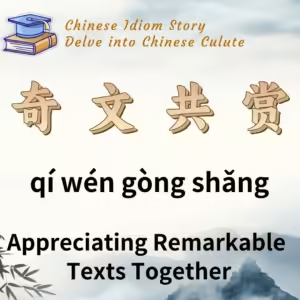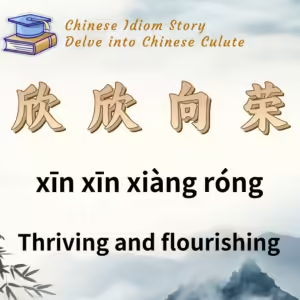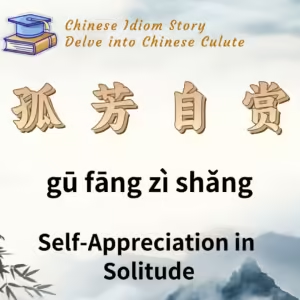
Chinese Idiom: 奇文共赏 (Qi Wen Gong Shang)
English Translation: Appreciating Remarkable Texts Together
pīn yīn: qí wén gòng shǎng
Idiom Meaning: This expression refers to the act of sharing and collectively critiquing literary works, especially those that are nonsensical or contain bizarre arguments.
Historical Source: Poem by Tao Yuanming (陶渊明) titled Moving to the South Village (《移居》), written during the Eastern Jin Dynasty.
Idiom Story:
In the year 406 AD, the famous poet Tao Yuanming resigned from his official position and returned to rural life. Immersed in labor and the simplicity of country living, he developed a deep appreciation for the joys of rural life. After a day of work, he would often drink and compose poetry, expressing his thoughts and aspirations.
In one of his well-known poems, Drinking Wine (《饮酒》), he reflects on the tranquility he finds in nature:
结庐在人境,而无车马喧。
问君何能尔?心远地自偏。
采菊东篱下,悠然见南山。
山气日夕佳,飞鸟相与还。
此中有真意,欲辨已忘言。
Translation: “I build my cottage among the people, yet am free from the clamor of carriages and horses.
If you ask how I achieve this, it is because my heart is distant from worldly distractions.
In the eastern fence, I pick chrysanthemums, and at ease, I gaze upon the Southern Mountain.
The mountain air at dusk is beautiful; birds return home in pairs.
Within it lies true meaning, which I cannot express with words.”
Tao’s poetry reveals his desire for a simple life, appreciating the beauty of nature and the pleasures of solitude.
Years later, around 410 AD, he moved to a new village in Xunyang, now known as Jiujiang in Jiangxi Province. Here, he mingled with like-minded friends who shared his passion for poetry and literature. In the poem Moving to the South Village, he writes:
昔欲居南村,非为卜其宅。
闻多素心人,乐与数晨夕。
怀此颇有年,今日从兹役。
敝庐何必广,取足蔽床席。
邻曲时时来,抗言谈在昔。
奇文共欣赏,疑义相与析。
Translation: “I desired to live in the South Village, not for its auspicious location,
But because I had heard of many pure-hearted people and enjoyed their company day and night.
I have long cherished this wish, and today it is finally realized.
My humble abode does not need to be spacious; it suffices to cover my bed.
My neighbors often visit, engaging in frank discussions about the past.
We appreciate remarkable texts together and analyze any uncertainties.”
The essence of the poem captures the joys of friendship, intellectual exchange, and the appreciation of literature. The final couplet, “奇文共欣赏,疑义相与析,” highlights the shared experience of enjoying fine writings and exploring ideas together.
Over time, this phrase was condensed to form the idiom “奇文共赏,” symbolizing the collective appreciation and critical analysis of literature, even if it is strange or unconventional. The idiom serves as a reminder of the value of community and dialogue in the pursuit of knowledge and understanding.






